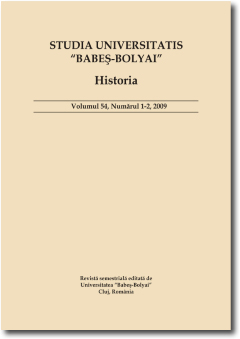PROFESSING DOMESTIC ORIENTALISM. REPRESENTING THE GYPSY AS MUSIKANT IN THE TRANSYLVANIAN SAXONS’ WRITINGS OF THE LONG 19TH CENTURY
PROFESSING DOMESTIC ORIENTALISM. REPRESENTING THE GYPSY AS MUSIKANT IN THE TRANSYLVANIAN SAXONS’ WRITINGS OF THE LONG 19TH CENTURY
Author(s): Marian ZăloagăSubject(s): History
Published by: Studia Universitatis Babes-Bolyai
Keywords: domestic Orientalism; Gypsies; Transylvanian Saxons; music; stereotypes.
Summary/Abstract: Professing Domestic Orientalism. Representing the Gypsy as Musikant in the Transylvanian Saxons’ writings of the long 19th century. Although it may appear as a forced import, researching Gypsies in the paradigm of Orientalism is motivated in a twofold manner. Firstly, such an approach is legitimised by the Gypsies’ Indian origin that was enounced at the end of the 18th century and amply discussed during the 19th century in the German area. Secondly, the Occidentals’ view which places the epicentre of the European Gypsy communities in the Transylvanian area also validates such an approach. Combined, these two elements are the main pillars of the Saxons’ contribution to Orientalism, a contribution that had a typical expression because it was determined by the lack of a colonial empire and by an east-European focus of research. The statements describing the Gypsies as exponents of primitivism often mentioned their involvement in niche activities such as musical performer. This discussion is not at all irrelevant because it is related to certain internal hierarchies that existed within the structures of European art, which found itself in a transformation process with effects beyond its specific purely aesthetic or technical boundaries. The results of these mutations can be discovered in the sphere of the European and Transylvanian Saxon cultural discourse alike. This discourse was infused with Herder’s ideas and domestic orientalism, as typified by the Gypsy musicians, demonstrates the Saxons’ receptivity towards a viewpoint specific to the German-speaking central-European area. And within this musical cultural perimeter, apparently predisposed to universalist-egalitarian judgements, the stakes were not other than separating their own culture, as consumers of certain performances, from the one of the performers.
Journal: Studia Universitatis Babes-Bolyai - Historia
- Issue Year: 57/2012
- Issue No: 2
- Page Range: 1-28
- Page Count: 28
- Language: English

